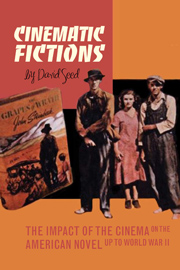Book contents
- Frontmatter
- Contents
- Introduction
- 1 Beginnings
- 2 Modernist Experiments: Gertrude Stein and Others
- 3 H.D. and the Limits of Vision
- 4 Ernest Hemingway: The Observer's Visual Field
- 5 Success and Stardom in F. Scott Fitzgerald
- 6 William Faulkner: Perspective Experiments
- 7 John Dos Passos and the Art of Montage
- 8 Dreiser, Eisenstein and Upton Sinclair
- 9 Documentary of the 1930s
- 10 John Steinbeck: Extensions of Documentary
- 11 Taking Possession of the Images: African American Writers and the Cinema
- 12 Into the Night Life: Henry Miller and Anaïs Nin
- 13 Nathanael West and the Hollywood Novel
- Bibliography
- Index
5 - Success and Stardom in F. Scott Fitzgerald
- Frontmatter
- Contents
- Introduction
- 1 Beginnings
- 2 Modernist Experiments: Gertrude Stein and Others
- 3 H.D. and the Limits of Vision
- 4 Ernest Hemingway: The Observer's Visual Field
- 5 Success and Stardom in F. Scott Fitzgerald
- 6 William Faulkner: Perspective Experiments
- 7 John Dos Passos and the Art of Montage
- 8 Dreiser, Eisenstein and Upton Sinclair
- 9 Documentary of the 1930s
- 10 John Steinbeck: Extensions of Documentary
- 11 Taking Possession of the Images: African American Writers and the Cinema
- 12 Into the Night Life: Henry Miller and Anaïs Nin
- 13 Nathanael West and the Hollywood Novel
- Bibliography
- Index
Summary
A Rival Career
F. Scott Fitzgerald was the supreme novelist of style. Throughout his writings he paid particular attention to how his characters constructed their social personae and what self-image they strove to project. Unlike Hemingway, he was drawn to all aspects of the movie business and one of his keenest disappointments came from his failure to achieve success in Hollywood. In 1936 Fitzgerald expressed his perception that the craft of the novel was ‘becoming subordinated to a mechanical and communal art […] in which words were subordinate to images, where personality was worn down to the inevitable low gear of collaboration. As long past as 1930’, he continued, ‘I had a hunch that the talkies would make even the best selling novelist as archaic as silent pictures’. Like many of his fellow writers Fitzgerald feared a loss of autonomy in Hollywood and could never come to terms with the collaborative screenwriting system. Despite those anxieties, he never wavered in his conviction that ‘the movies are a tremendously important question’, as he declared in a 1923 interview.
Fitzgerald became a keen movie-goer in 1906 but it was around 1919 that his professional involvement in the cinema began with writing film scripts. The next year he sold the film rights to his story ‘Head and Shoulders’ to Metro and, by his own account, approached D. W. Griffith with a proposal for a film about film-making, Griffith's reaction being ‘immediately contemptuous’.
- Type
- Chapter
- Information
- Cinematic FictionsThe Impact of the Cinema on the American Novel up to World War II, pp. 86 - 106Publisher: Liverpool University PressPrint publication year: 2009



